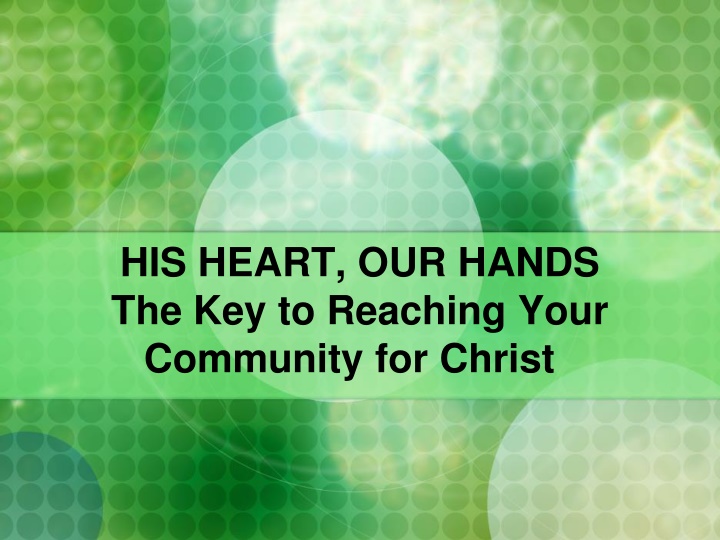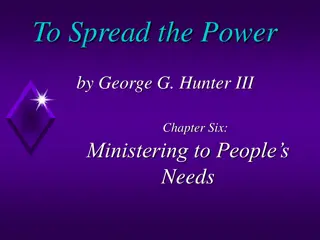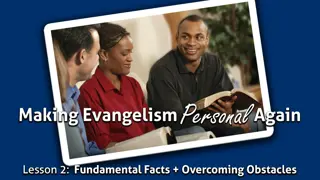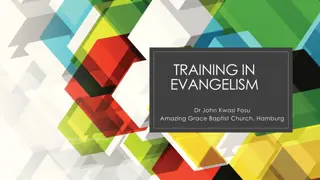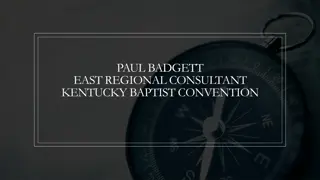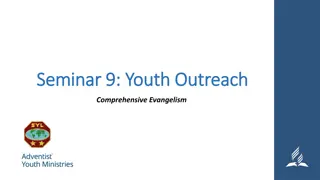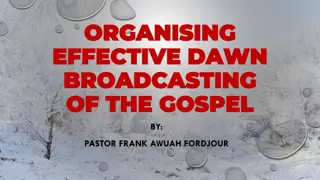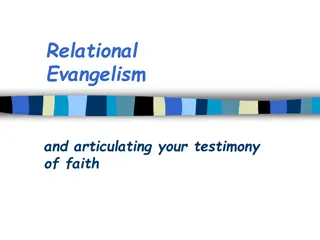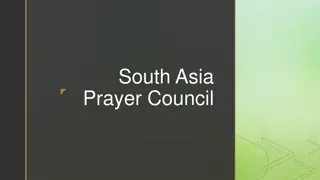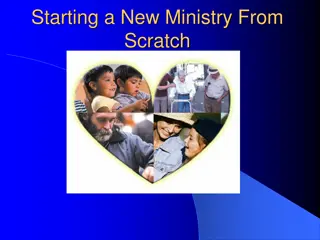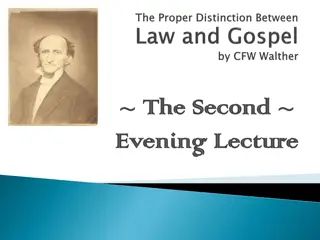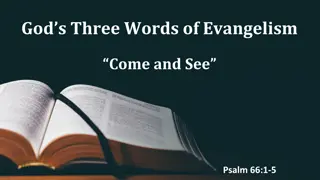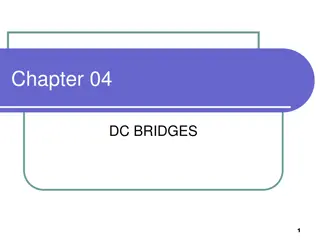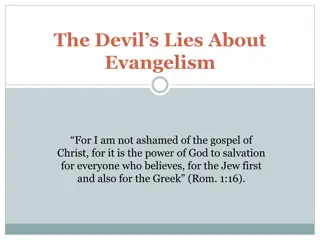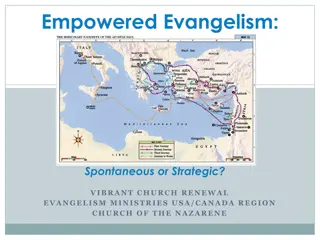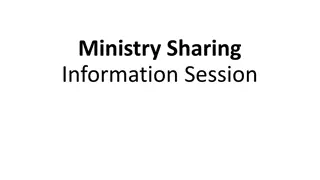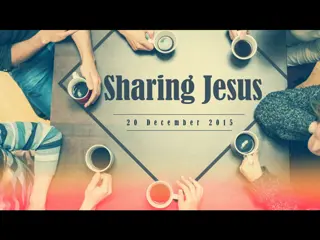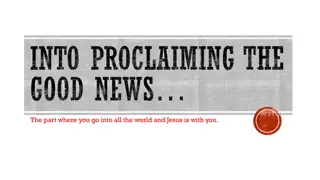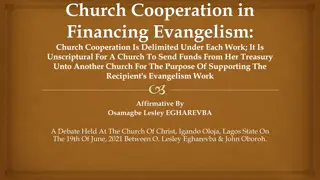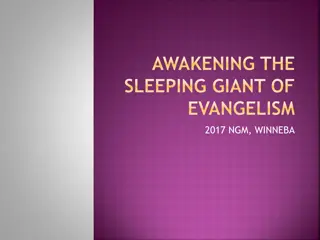Ministry-Based Evangelism: Building Bridges for Gospel Sharing
Ministry-Based Evangelism involves intentionally sharing the Gospel of Jesus Christ through relational bridges built via ministry activities. This approach identifies prospects, creates witnessing relationships, and connects the church with the community. Conducting a community assessment is crucial for gaining insights and credibility, understanding the culture, and effectively reaching out to the unchurched.
Download Presentation

Please find below an Image/Link to download the presentation.
The content on the website is provided AS IS for your information and personal use only. It may not be sold, licensed, or shared on other websites without obtaining consent from the author.If you encounter any issues during the download, it is possible that the publisher has removed the file from their server.
You are allowed to download the files provided on this website for personal or commercial use, subject to the condition that they are used lawfully. All files are the property of their respective owners.
The content on the website is provided AS IS for your information and personal use only. It may not be sold, licensed, or shared on other websites without obtaining consent from the author.
E N D
Presentation Transcript
HIS HEART, OUR HANDS The Key to Reaching Your Community for Christ
WHAT IS MINISTRY BASED EVANGELISM? Ministry Based Evangelism is building relational bridges through ministry over which a Christian can intentionally share the Gospel of Jesus Christ.
BENEFITS OF MINISTRY BASED EVANGELISM Identifies Prospects Builds Witnessing Relationships Creates Opportunities to Share the Gospel Connects Your church with Your Community Increases Visibility of Church As Caring
BENEFITS OF MINISTRY BASED EVANGELISM Creates New Service Outlets for Members Equips Believers to Grow in Discipleship Reaches People Who Are Unchurched Enables Members to Catch A Vision for Local Missions Helps Church Communicate the Gospel in Word and Deed
The Word Became Flesh John 1:14
People Are More Than Twice As Likely to Allow a Person to Share Their Faith When Evangelism Is Combined With Simple Acts of servanthood.
HOW DO I GET STARTED? The starting point for ministry based evangelism is a current community assessment
Why do a Community Assessment? It is the standard approach organizations use to gain information about their community Helps you gain credibility Gives you a market study for a new church or for a new ministry Gets team members into relationships with the community Tells you where people are hanging out you need to have people hanging out there as well Helps you decode the culture we serve in our communities for years before we really understand the culture we are in.
Why do a Community Assessments? If you are starting a church, it gives you a dramatic increase in the number of start up relationships. Open doors for ministry and resources Creates a deeper insight into the culture It can link your church to social networks and their hubs more quickly It can focus your community service efforts more specifically so you can serve your target audience develops public recognition of the service character of your church allows you to identify multiple persons of peace
VALUE OF AN ASSESSMENT typically costs $25,000 to $30,000 to have a community assessment done. They are often printed up and become a policy guide for decision making in the community. Everyone wants a copy of it. It will be referenced in grants. Sets your church up as a community leader
The most important thing. . . . BUILDING RELATIONSHIPS With community leaders With people in the community With community service organizations With your church members/church plant team
How Long Will it Take? It will probably take 6 months to a year. Take the time to do it right. Remember, it s not about the assessment, it s all about building relationships You want ministries that are strong and lasting. This assessment will become the basis for those ministries.
PUTTING TOGETHER YOUR TASK FORCE Chairperson and Vice Chairperson Task Force Representatives Secretary Prayer Group Chairperson Interview Chairpersons 5 Demographics Chairperson Church Survey Chairperson
PRAYER Prayer Journeys Prayer Support
PRAYER JOURNEYS A community prayer journey is an intentional coordinated effort to pray for and share Jesus with every person in a chosen geographical area or cultural community. Community prayer journeys help believers to balance the importance of prayer in preparation for witnessing, ministry, or during outreach events.
As you are journeying ask: What am I observing that is good about this community? What am I observing that may be an opportunity for our church to meet needs or build relationships Who is already ministering in this community? Are there people or organizations here that might be potential collaborators? What opportunities for employment are here?
PRAYER SUPPORT Teams at the church praying over maps where teams are surveying Individuals praying at home Teams walking the perimeter of events
COMMUNITY INTERVIEWS Door to Door Interviews Group interviews
DOOR TO DOOR INTERVIEWS Determine the agency/individuals to be interviewed Select a date for the interviews Recruit volunteers set appointments send a letter of confirmation one week before the appointment date.
SUGGESTED SCHEDULE 8:30 am 8:50 Continental breakfast Pairing of teams and distribution of assignment cards Orientation Departure for appointments First appointment Second appointment Lunch and sharing, time to complete written reports 9:00 9:30 10:00 11:00 Noon
INTERVIEWING COMMUNITY SERVICE ORGANIZATIONS Yellow Pages Local United Way Local Library Report of Newspaper Review Committee
COMMUNITY SERVICE ORGANIZATIONS Put all names on index cards and sort the cards according to importance for your church to visit them.
INTERVIEW ELECTED AND APPOINTED OFFICIALS Mayor City Council Members Chief of Police Fire Chief Sheriff
INTERVIEWING OF LOCAL BUSINESS LEADERS Employment opportunities and prospects for the future What the qualifications are for employment. Obstacles people face for employment What this business does to give back to the community
INTERVIEWING THE RELIGIOUS COMMUNITY Before you start a new ministry, it would be good to know what other churches in your community are already doing in that area. Knowing what other churches are already doing helps you to see possibilities for collaborations. Knowing what faith communities are a part of your community helps you to train you members. Start with the yellow pages for a list of churches in our area.
INTERVIEWING PEOPLE WHO LIVE IN THE COMMUNITY Door to Door Interviews Group Interviews
CONDUCTING DOOR TO DOOR INTERVIEWS Decide which neighborhoods you will survey Use the interview form
CONDUCTING GROUP INTERVIEWS Select locations where people will normally gather and that are safe Possibilities Starbucks on Saturday morning Free lemonade in the Wal-Mart parking lot A small fair in the park with food and games Remember to keep the interview short or you will lose the attention of the people you are interviewing
USING DEMOGRAPHICS www.census.gov www.missionalresearch.info Your state convention
USING DEMOGRAPHICS Compare demographics from your community with state and national information Note any categories that contain any high percentages or large or unusual numbers Compare the demographics of your church with the demographics of your community Look for institutional group quarters where ministry might take place Look for rapidly growing populations Look for rapidly declining areas. Look for populations of children who may need tutoring, after school ministries or child care. Look for senior adult population
NEWSPAPER REVIEW Collect issues for the last year Divide the issues up among your team members and have them clip any articles about resources or needs in the community. Have them divide the clippings into 2 boxes, one for resources and the other for needs. Divide the team into two groups. One will work on resources and the other on needs Divide the clippings further
REPORTING YOUR FINDINGS: For resources, make a list of all the resources according to the categories your team identifies For needs, start with a synopsis of the top five needs you discovered. Then list all of the needs according to the categories you identifies and put the number of articles you found about those needs.
CHURCH SURVEY What areas of need in your community your church members are aware of. What areas of ministry interest them What skills, knowledge and abilities do they have that could be used for ministry. What connections do they have in the community?
CHURCH SURVEY Hand out surveys as part of a special service on serving your community or during Sunday School. You will get more back that way.
PUTTING IT ALL TOGETHER The Weighted Ministry Evaluation Chart The Church/Organization Effect Matrix
SAMPLE WEIGHTED MINISTRY EVALUATION CHART Criteria 1 - Need in the Community needed knowledge and skills Totals Criteria 2 - People with % Criteria 3 - Volunteers willing to work % Criteria 4 - Resources % Criteria 5 - Space % Criteria 6 - Finances % Criteria 7 - Potential Collaborations % % Weight (total must equal 100) 15 20 20 10 10 15 10 100 After School Tutoring 9 1.35 8 1.6 7 1.4 5 0.5 8 0.8 5 0.75 2 0.2 6.6 Pregnancy Care Center 7 1.05 3 0.6 4 0.8 5 0.5 7 0.7 5 0.75 3 0.3 4.7 Food Pantry Teen-age Boy's Mentoring Skate Board Ministry 6 9 1.8 8 1.6 4 0.4 5 0.5 3 0.45 7 0.7 6.35 0.9 8 4 0.8 3 0.6 9 0.9 9 0.9 8 1.2 3 0.3 5.9 1.2 3 0.45 1 0.2 2 0.4 2 0.2 2 0.2 2 0.25 1 0.1 1.8 Day Care 8 2 0.4 4 0.8 3 0.3 3 0.3 2 0.25 3 0.3 3.55 1.2 Prison Visitation 4 3 0.6 3 0.6 9 0.9 9 0.9 9 1.35 1 0.1 5.05 0.6 ESL Refugee Resettlement 5 0.75 1 0.2 5 1 3 0.3 4 0.4 4 0.6 1 0.1 3.35 7 1.05 2 0.4 8 1.6 8 0.8 8 0.8 5 0.75 7 0.7 6.1 DDM Ministry Missionaries to Service Organizations 6 2 0.4 4 0.8 6 0.6 5 0.5 5 0.75 3 0.3 4.25 0.9 9 1.35 5 1 4 0.8 8 0.8 10 1 8 1.2 9 0.9 7.05 Job Preparedness 7 1.05 1 0.2 4 0.8 3 0.3 4 0.4 4 0.8 5 0.5 4.05
CHURCH EFFECT MATRIX Ministry CV 1 Christ Centered CV2- Small groups CV3-funded by members CV4-Evangelistic CV5- Family Oriented CV6-No debt CV7-Equip Members CV8- Inclusive Obj1- Equip to Evangelize Obj2-Engage to minister Obj3-healthy families Obj4-Worship Obj5-Relevant to community Obj6-Biblically literate Totals Ind Dev Acct 3 5 3 2 0 0 5 3 1 2 0 0 4 1 29 Msys to Orgs 3 5 5 4 2 3 5 2 4 5 1 2 5 3 49 Tutoring 5 5 4 5 2 3 5 3 4 3 1 1 4 4 49 Food Pantry 5 3 5 3 3 3 3 2 3 2 1 1 5 3 42
THINGS TO CONSIDER Don t do a ministry because you see other people doing it You don t always have to start a new ministry. You might join someone else that is already doing a ministry and just add something to that ministry. Offer to add the spiritual aspect to an existing program. Don t ever let a tool take the place of the leadership of the Holy Spirit.
SERVANTHOOD EVANGELISM If your church isn t used to being in the community, servanthood evangelism is a great place to start. Move on to longer term ministries after the congregation is comfortable in the community. Servanthood evangelism is a process, not an event
What Is Servanthood Evangelism? Servanthood evangelism is intentionally sharing Christ by modeling biblical servanthood. Servanthood evangelism is a combination of simple acts of kindness and intentional personal evangelism.
Servanthood Evangelism Can Be Done By Women Senior adults Teenagers Children Inter-generational
Foundational Principles Those participating must be intentionally evangelistic. Those participating must genuinely care about people. Eventually, those participating need be equipped as personal witnesses.
How to Begin Servanthood Evangelism Seek God s power and presence. S E Enlist the people. R Resource. Vacate the church. V Evaluate. E
Examples of Servanthood Evangelism Single mom s oil change Windshield washing Change burned out light bulbs Give away water in a park in the summer Free house number painting on curbs Feed parking meters Leaf raking
STRONG FOUNDATIONS Mission: STRONG Foundations exists to strengthen the work of evangelical non-profit ministries and congregations by providing tools and training for Strategic planning, Team development, Resource expansion, Organizational design, Network building, and Grant writing. The Vision of STRONG Foundations is that every evangelical ministry and congregation will have the resources needed to accomplish their God given mission. Dr. Catherine Miller (864) 617-0646 cmiller@strongfoundations.org
www.namb.net/ccm Community Assessment on left navigation bar www.namb.net/resources
